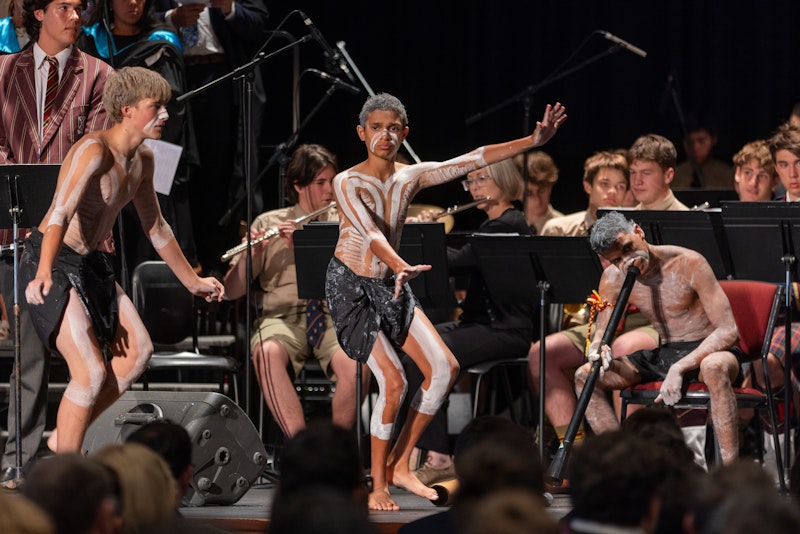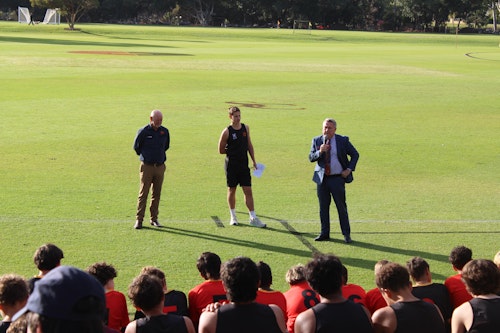
Bennell (Year 10), Heath (Year 9) and Ben (Year 12) performing alongside our College Concert Band
Honouring the past, shaping the future: reconciliation in focus
Headmaster's Blog
Reconciliation Week at Scotch College Perth is a time of profound respect, reflection, and resolve. We honour the Elders past and present, and look to the future — one shaped by knowledge, empathy, and shared responsibility.
What is Reconciliation Week?
Each year, between 27 May and 3 June, Australians come together to mark National Reconciliation Week. This week is a time to reflect, learn, and grow as a nation. At Scotch, it holds deep significance as we honour the histories, cultures, and contributions of Aboriginal and Torres Strait Islander peoples, and reaffirm our commitment to truth-telling, healing, and unity.
Significance behind the dates
While the week begins on 27 May, 26 May is also a day of national significance as it is marked by National Sorry Day and commemorates the anniversary of the tabling of the Bringing Them Home report in 1997.
This landmark report followed a national inquiry by the Human Rights and Equal Opportunity Commission, documenting the experiences of the Stolen Generations and calling for an official apology and reparations.
Interestingly, the recently re-elected Western Australian government, led by Roger Cook (OSC 1982), has announced it will implement reparation payments earlier this week.
The origins of Reconciliation Week
Reconciliation Week began in 1996, initiated by the Council for Aboriginal Reconciliation. Its dates are not arbitrary; they are anchored in two pivotal milestones in Australia's journey toward reconciliation.
27 May marks the anniversary of the 1967 Referendum, in which over 90% of Australians voted to amend the Constitution, allowing the federal government to make laws for Aboriginal and Torres Strait Islander peoples and include them in the census.
3 June commemorates the historic Mabo Decision of 1992, when the High Court of Australia legally recognised the Meriam people's traditional ownership of their land in the Torres Strait, overturning the long-enforced precedent of terra nullius — the notion that the land belonged to no one. These dates bookend a week of national significance, symbolising both progress and the work still to be done.
Reconciliation at Scotch
Formal opening of our Clontarf Academy

Clontarf CEO - Gerard Neesham, Cooper (Year 12) and Headmaster Dr Alec O'Connell
At Scotch, Reconciliation Week started a little earlier with the formal opening of our Clontarf Academy last Thursday.
The College and Clontarf Foundation are both excited by this new model of placing a Clontarf Academy in an independent boarding school, and CEO Gerard Neesham spoke passionately about the potential for the link with Scotch.
Early feedback from families has also been glowing about the support and structure that having an academy at Scotch has brought. As Clontarf Academy Director and Old Scotch Collegian (2010) Nic Munro said,
Reconciliation Week is a reminder that our culture is strong. It's a chance to share who we are, to be heard, and to ask others to walk with us. The Clontarf Foundation plays a vital role in this journey by supporting Indigenous young men to embrace their identity, achieve through education, and lead with pride - building a future where culture and opportunity go hand in hand.
Sir Doug Nicholls Round and Indigenous PSA Round

Bennell (Year 10) and Ben (Year 12) performing at Optus Stadium for Sir Doug Nicholls Round
The AFL's Sir Doug Nicholls Round included two of our boys, Bennell and Ben, dancing before the Waalitj Marawar (West Coast Eagles) versus Euro-Yroke (St Kilda) game.
 Barry Winmar and Rob (Year 12)
Barry Winmar and Rob (Year 12)
during the smoking ceremony
The College also hosted its own indigenous round last weekend against Aquinas, where we honoured our location next to Galbamaanup (Lake Claremont) and had a particularly moving smoking ceremony overseen by Barry Winmar.
Literature on reconciliation and the journey of Aboriginal people in Australia
As part of our commitment to education and understanding, Scotch College Perth encourages students and families to engage with literature that supports empathy and reconciliation.
Below is a curated list of age-appropriate books that explore Australia's shared history, the experiences of Aboriginal and Torres Strait Islander peoples, and the journey toward healing and mutual respect.
"Sorry Day" by Coral Vass & Dub Leffler
A moving picture book that contrasts the historic 2008 National Apology with the lived experience of the Stolen Generations, seen through the eyes of children.
"My Place" by Nadia Wheatley & Donna Rawlins
This classic book traces one piece of land through time, offering diverse voices and perspectives, including Aboriginal families.
"The Shack That Dad Built" by Elaine Russell
A heartwarming and humorous story based on the author's childhood in an Aboriginal community in western New South Wales.
"Black Cockatoo" by Carl Merrison & Hakea Hustler
A short novel about growing up in the Kimberley, exploring themes of cultural pride, resilience, and connection to Country.
"Follow the Rabbit Proof Fence" by Doris Pilkington
This book, perhaps more famous for its film adaptation, is the story of Doris's mum and her siblings, as they escape the Moore River Native Settlement and follow Western Australia's rabbit proof fence to their home near the community of Jigalong.
"Sorry and Beyond: The Politics of Indigenous Reconciliation" by John Wilson
A thoughtful and accessible examination of Australia's reconciliation journey since the National Apology, ideal for senior students exploring civics and society. The book encourages respectful understanding and discussion without being confrontational.
"Tell Me Why: The Story of My Life and My Music" by Archie Roach
A personal memoir by one of Australia's most beloved Aboriginal artists, reflecting on loss, identity, and healing. Suitable for mature readers.
"Sorry and Beyond: Healing the Stolen Generations" by Brian Butler and John Bond
Tells the story of the growth of the grassroots movement that exposed truths and worked for healing and justice, and is a call to continue healing the trauma.
Dr Alec J O'Connell
Headmaster



 Barry Winmar and Rob (Year 12)
Barry Winmar and Rob (Year 12)